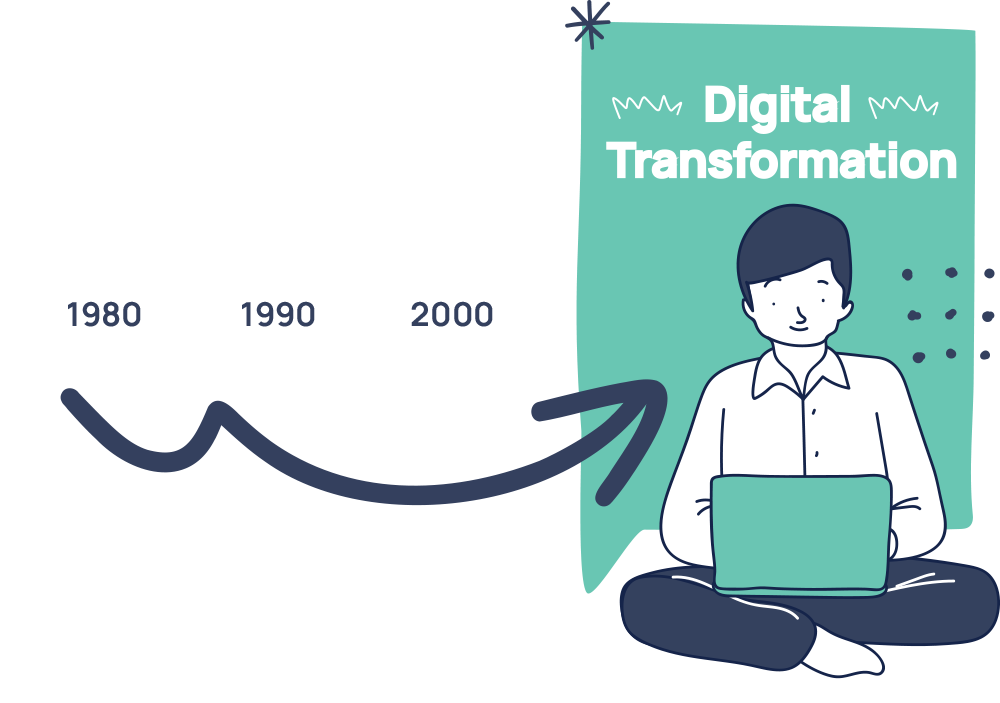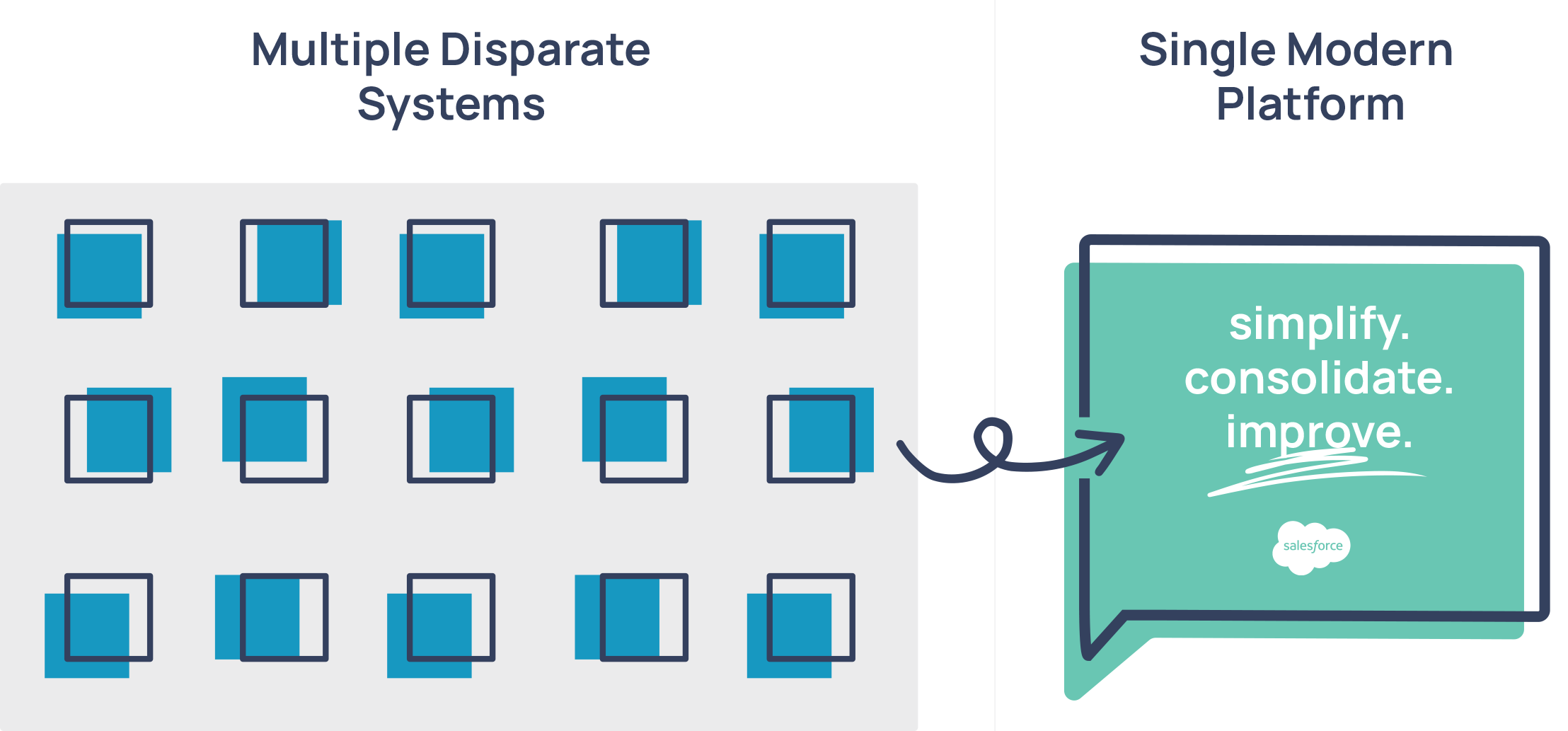From the 80s to the early 2000s in particular, PE strategies stagnated. Private equity firms overwhelmingly used leverage, facility closures, or restructuring as fundamental strategies for growth. While these financial maneuvers manifested short-term revenue gains, they failed to create sustainable value that actually improved businesses. Ultimately, exit valuations were jeopardized by these short-term tactics.
The savviest PE firms pivoted to strategies informed by an obvious conclusion; long-term value could be generated by focusing on business improvement.

Business improvement across a portfolio can be achieved in many ways, including debt refinancing, process improvement, and restructuring. Lately, PE firms are turning to technology as a significant driver for value creation.
According to a KPMG study, not only are technical investments becoming the preferred strategy for value creation, but PE firms are relying on consulting partners with industry expertise to enhance their portfolio, often before the deal closes. 1
But which technologies have the best chance to create value, healthy EBITDA margins, and continuous innovation in a healthcare portfolio? It comes down to the right investments in digital transformation and the expertise of your tactical team.
Best Digital Transformation Investments to Create Value in your Portfolio
There are several vital things digital transformation platforms should address across patient experience, sales processes, and the regulatory landscape. Let’s take a look at the most important ones.
Patient-Facing Experience Improvements
Digital transformation influences how patients, partners, or physicians interact with a brand. It’s no secret that healthcare companies often lag behind industries like retail regarding innovative user experiences. However, as healthcare continues to be defined by consumerism, this gap creates an opportunity. Healthcare brands can differentiate themselves on experience – the earlier they do it, the more impactful that differentiation will be.
The ROI your portfolio companies can achieve from marketing technology is backed up by a recent report from MarketScreener. Research revealed that companies see a nearly 300% return on investment with Salesforce Marketing Cloud, one of the leading automation tools for engaging patient journeys.
Sales Process Automation
Many B2B sales teams are plagued by fundamental issues that lead to longer deal cycles, inaccurate forecasts, and lost business. What starts as one-off shortcuts to save time by rogue sales agents becomes crippling inconsistency in the process. This is where sales process automation can help. By automating the sales process, you can create a consistent activity at each stage in the sales cycle, leading to shorter sales cycles, accurate pipeline forecasts, and more wins.
The ROI your portfolio comapnies can achieve
Data Unification
Healthcare companies often own a ton of demographic, clinical, or behavioral data. However, their data isn’t valuable on its merit – it’s only valid if it’s helpful. Many of your current or future portfolio companies probably have disparate data across sales, marketing, and clinical systems. This is where data unification comes in. Unifying data in a customer data platform (CDP) creates an actionable person profile containing a 360° view of patients, partners, or providers. To drive more revenue opportunities, communications can be personalized at scale with segmentations based on demographics, behavior, and clinical data.
AI-Driven Analytics
Analytics drive better business outcomes. With the power of AI, your portfolio companies can demonstrate cross-channel, enterprise-level insights across patient, partner, or provider marketing data sources – marking it possible to identify the strategies that create value and those that don’t.
Customer Relationship Management Platforms
The CRM is a fundamental component of any business’ tech stack, but it’s often misunderstood as “just a data repository.” Healthcare companies undergoing value creation measures require CRMs capable of more than record storage. They need to be scalable for growth, tailored to business goals and backed up by a company focused on innovation. In addition, success is repeatable, so successful CRM deployments should be architected for replication at similar companies in your portfolio.
Technical Debt Elimination
Debt is a four-letter word. And similar to four-letter words, some technical debt is expected – but too much isn’t a great look. Technical debt can lower exit value due to redundant contract expenses and security implications. This is even more true in healthcare, where speed could save lives…and misconfigurations can expose PHI. PE firms have incorporated a strategy referred to as “app rationalization” to address this. App rationalization seeks to eliminate outdated technology systems and replace them with modern platforms.

Security Investments
Security investment is not only crucial to long-term value. They also hold short-term significance by protecting against data breaches that could wipe out any chance at exit value.
Regulatory Compliance
Regulatory compliance protects you from fines in the short term and minimizes risk in a long time. For example, suppose your portfolio companies aren’t compliant with HIPAA, HITECH, or GDPR. In that case, it won’t be easy to go public with an IPO or sell to scrupulous investors at the exit.
The Expertise Needed to Create Digital Transformation
Your team needs vision and industry experience to implement digital transformation platforms. Here are a few of the critical components that ensure value creation.
Industry Focus
Healthcare-focused PE firms need partners (or internal teams) with experience in digital transformation for healthcare & life sciences companies. Healthcare services, pharmaceuticals, med tech, and insurance companies have different business requirements and goals. Therefore, it takes a specialized team to analyze and improve processes across sales, marketing, operations, and clinical teams.
Repeatable Acceleration
It’s essential to retain a catalog of successful strategies. That way, successful tactics can be redeployed at scale for new portfolio additions in the same industry vertical.
Platform Focus
Stick with a specific technological ecosystem for defined use cases, whether marketing automation, customer relationship management, or clinical systems. It will allow you to accelerate deployment and utilize technologies with known outcomes; you’ll probably also save on license costs.
Centralized Partnership Management
If you enlist external help, try to streamline the experience in a single consultant with deep expertise in your industry (if they have the bandwidth for your portfolio). This ensures that success can be repeated across your entire portfolio with the simplicity that a single point of contact brings.
Constant Innovation
Your team, partner, and software vendors should have a proven focus on constant innovation. Likewise, the success of your healthcare portfolio relies on consistent process improvement, and you’ll want to consider the latest technologies to ensure they have access to the latest tools that fuel growth.


